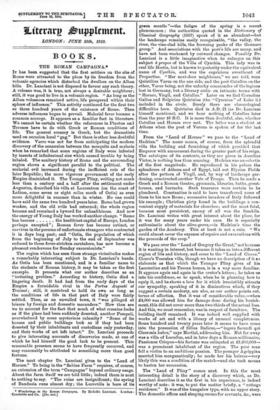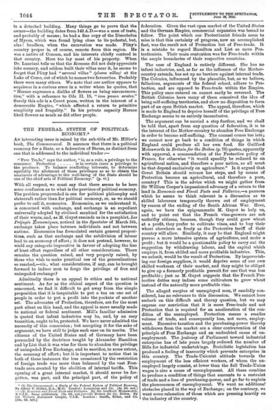BOOKS.
THE ROMAN CAMPAGNA.*
IT has been suggested that the first settlers on the site of Rome were attracted to the place by its freedom from the volcanic agencies which disturbed the dwellers on the Alban hills. Dr. Lanciani is not disposed to favour any such theory. A volcano was, it is true, not always a desirable neighbour ; still, it was good to live in a volcanic region. "As long as the Alban volcanoes remained active, life prospered within their sphere of influence." This activity continued for the first two or three hundred years of the existence of Rome. Then adverse influences began to prevail. Malarial fever became a common scourge. It appears as a familiar fact in literature. We cannot be certain whether the references in Plautus and Terence have to do with Greek or Roman conditions of life. The general scenery is Greek, but the dramatists used on occasion local "gag." But there is other less doubtful evidence. Varro was not far from anticipating the modern discovery of the connexion between the mosquito and malaria when he remarked that some regions of Italy were infested by insects of infinitesimal size which caused trouble by being inhaled. The sanitary history of Rome and the surrounding region shows a significant parallel to the political. The malarial evil increased during the inefficient rule of the later Republic ; the more vigorous government of the early Empire diminished it. The Younger Pliny, writing not much less than a century and a half after the settlement under Augustus, described his villa at Laurentum (on the coast of Latium, some seven or eight miles south of Ostia) as even more delightful in summer than in winter. No one could have said the same two hundred years later. Rome had grown weaker, and the old evils had returned; the whole region became and remained a byword for unhealthiness. And now the energy of Young Italy has worked another change. " Rome
has become the healthiest capital of Europe, London perhaps excepted"; Roman fever has become extinct, or survives in the persons of unfortunate strangers who contracted it in days long past; and " Ostia, the population of which from the beginning of July to the end of September was reduced to three fever-stricken caretakers, has now become a pleasant rendezvous for Sunday excursionists."
The region which has seen these strange vicissitudes makes a remarkably interesting subject in Dr. Lanciani's bands. As Ostia has been mentioned, and is a familiar name to the students of Roman history, it may be taken as the first example. It presents what our author describes as an "irritating problem." According to history, Ostia died a lingering death. It had had from the early days of the Empire a formidable rival in the Portus Augusti et Traiani ; still, it contrived to hold its own as long as the conditions of life in that part of Italy were fairly settled. Then, as an unwalled town, it "was pillaged at leisure by foreign and domestic marauders." How then are we to account for the fact that much of what remains looks as if the place had been suddenly deserted, another Pompeii, overwhelmed by some mysterious calamity P " Some of its houses and public buildings look as if they had been deserted by their inhabitants and custodians only yesterday, and their works of art left intact." Dr. Lanciani proceeds to give interesting accounts of discoveries made, at one of which he had himself the good luck to be present. This seasonable presence seems to have frequently occurred, and may reasonably be attributed to something more than good fortune.
The next chapter Dr. Lanciani gives to the "Land of Horace." To bring in the "Sabine Farm" requires, of course, an extension of the term "Campagna" beyond ordinary usage. About the farm itself we are told little ; indeed there is next to nothing to say. " The ruins are insignificant ; the spring of Bandusia runs almost dry ; the Lucretilis is bare of its • Wanderings in the Boman Campagna. By Rodolto Lanciani. London : Constable and Co. [21s. net.]
green mantle "—the failure of the spring is a recent phenomenon ; the authorities quoted in the Dictionary of Classical Geography (1857) speak of it as abundant—but the landscape remains easily recognisable, "the valley, the river, the vine-clad hills, the frowning peaks of the Gennaro group." And associations with the poet's life are many, and have not been weakened by outward changes. Possibly Dr. Lanciani is a little imaginative when he enlarges on this subject a propos of the Villa of Cynthia. This lady was in real life Hostia, but is known to posterity under the equivalent name of Cynthia, and was the capricious sweetheart of Propertius. "Her next-door neighbours," we are told, were Quintilius Varus on the one side, and the poet Catullus on the other, Varus being, not the unlucky commander of the legions lost in Germany, but a literary critic on intimate terms with " Horace, Virgil, and Catullus." Later on we find Cornelius Gallus and Sulpicius Quirinius (the " Cyrenius " of Luke ii.) included in the circle. Surely there are chronological difficulties here. Quirinius died in A.D. 21 (as Dr. Lanciani himself mentions), and we hear nothing of Catullus later than the year 46 B.C. It is more than doubtful, also, whether Catullus and Horace ever met. The latter was a student at Athens when the poet of Verona is spoken of for the last time.
From the " Land of Horace " we pass to the " Land of Hadrian." The name comes, of course, from the splendid villa the building and furnishing of which provided that Emperor with amusement during the greater part of his reign. The catalogue of its contents, as they are given in Aurelius Victor, is nothing less than amazing. Hadrian was an eclectic of the first magnitude. He reproduced in his palace the splendours of Athens and of Egypt, laid out Elysian Fields after the pattern of Virgil, and, by way of landscape gar- dening, constructed another Vale of Tempe. Then he made a Greek and a Roman theatre, gymnasia, libraries, baths, guest- houses, and barracks. Such treasures were certain to be plundered. Constantine is said to have transferred some of them to his new Rome ; successive invaders of Italy followed his example ; Christian piety found in the buildings a con- venient supply of materials for churches ; and the most fatal, because most persistent, enemy of all was the limekiln. Dr. Lanciani writes with great interest about the place, for it was for many years under his care. He is especially enthusiastic about the olive-grove,—in Hadrian's time the garden of the Academy. This at least is not a ruin. " We could almost cover the expense of repairs and excavations with the proceeds of the crop."
We pass over the " Land of Gregory the Great," not because it is wanting in interest, but because it takes us into a different region of life and history, and come to the "Land of Cicero." Cicero's Tusculan villa, though we have no description of it so elaborate as that which the Younger Pliny gives of his Laurentine and his Tuscan homes, is in a way more familiar. It appears again and again in the orator's letters ; he takes us into his confidence, so to speak, when he is planning how to equip it, and he shows a love for it which irresistibly attracts our sympathy, speaking of it in diminutives which, if they suggest a certain modesty, are also, as our author points out, terms of affection. But it was of considerable value,—when £4,000 was allowed him for damage done during his banish- ment, this did not cover more than two-thirds of the actual loss. And this, we must remember, was in respect of furniture. The building itself remained. It was indeed well supplied with works of art and with a library of unusual completeness. Some hundred and twenty years Later it seems to have come into the possession of Silius Italicus,—" iugera facundi qui Ciceronis babes," says Martial, addressing him. Not far away was a villa of Lucullus, and in later days a Roman millionaire, Passienus Crispus—his fortune was estimated at £1,600,000— was a prominent inhabitant of the region. The poor man fell a victim to an ambitious passion. The younger Agrippina married him morganatically; be made her his heiress—very likely this was a condition of the match—and she took means to hasten her succession.
The "Land of Pliny" comes next. In this the most interesting detail is the story of a discovery which, as Dr. Lanciani describes it as the first in his experience, is indeed worthy of note : it was, to put the matter briefly, a " cottage residence." It was of the bungalow type, with no upper story. The domestic offices and sleeping-rooms for servants, &c., were in a detached building. Many things go to prove that the owner—the building dates from 142 A.D.—was a man of taste, and probably of means ; he had a fine copy of the Discobolus of Myron, which was found lying close to its pedestal, but, alas ! headless, when the excavation was made. Pliny's country proper is, of course, remote from this region. He was a native of Comum, and his interests chiefly centred in that country. Here too lay most of his property. When Dr. Lanciani tells us that the Romans did not duly appreciate lake scenery, and seldom built their villas near it, he seems to forget that Pliny had " several villas" (plures villas) at the Lake of Como, out of which he names two favourites. Probably there were many others. We note that our author appears to acquiesce in a curious error in a writer whom he quotes, that " Horace expresses a dislike of flowers as being unremunera- tive," with a reference to Ode II. 15, " iam pauca aratro." Surely this ode is a Court poem, written in the interest of a democratic Empire, " which affected a return to primitive simplicity and frugality." In his private capacity Horace liked flowers as much as did other people.























































 Previous page
Previous page